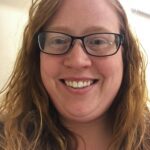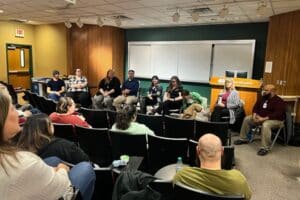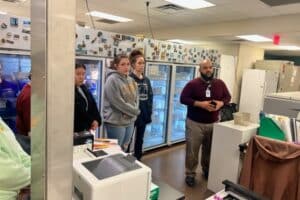Volume 38 Number 2 | April 2024
Ali Nussbaum, MHHSA, MLS(ASCP)CM, caPM, ASCLS Board of Directors

Step 1: Get Permission
It is important to get permission from the workplace if the plan is to allow students into the facility. Additionally, a sponsored event with ASCLS will require reaching out to leaders from the local constituent society to ensure participation. The event will likely be in the evening due to schedules, so it is important to know that the lab is accessible, the shift supervisor is aware of the event, and that security knows that people will be there during off-hours. Once all the permissions have been obtained and the sponsorship with ASCLS is confirmed, the next stage is to secure a space, like a conference room or auditorium near the lab.
Step 2: Determine Activities of the Evening
A tour of the lab is a given for a student night, because not all students have access to a “real” laboratory. This will likely be the largest draw for students, so it’s worth trying to arrange the tour. Next, consider what other activities will encourage students to attend. One of the most engaging events that is easy to do is a panel of professionals. Have six to 10 panelists from a wide range of jobs within the lab (like an off-shifter, supervisor, lead tech, cytotech/histotech, LIS, industry, etc.), have them explain how they got to their current role in two to three minutes each, and follow that up with a question-and-answer session. Other activities to think about are quality talks about the profession, the hospital (recruitment effort), benefits of membership in a professional society, and other skill-building items, like interviewing or resume building. If there is a large group or interest, offering practice interviews or resume reviews may be well received as well.
Step 3: Advertise
Advertising is an obvious need; if students do not know you are holding the event, they will not attend. Keep it simple, use plain language, and ensure that all the necessary information is present, such as directions, parking information, time, activities, etc. There is no need to create everything from scratch, as you can borrow other flyers and redesign them. Once the flyer/advertisement is complete, it is time to target your audience. At our event, we targeted all the MLT/MLS schools near our hospital. Utilize social media platforms to hit the broadest audience possible. This should include your hospital’s social media account (which may involve contacting the hospital’s social media rep to get it posted). Lastly, do not forget the oldest form of advertisement: word of mouth! Talk about the event to anyone and everyone who might be interested.
Step 4: Recruit Volunteers to Make it a Success
All successful events require volunteers. After planning which activities are going to be at the event, consider how many people will need to volunteer. If the event has a panel, find six to 10 panelists. If the evening has a tour, look for people who can help give quality tours. If it has mock interviews or resume reviews, find people willing to do that. Ask around the ASCLS constituent society for people willing to help at the event. Having positive, upbeat volunteers for the event is key: the goal is to recruit people to the profession, not scare them away.
Step 5: Extra Things to Consider for the Event
Snacks! Everyone likes free snacks and drinks, so see if there is a budget to cover food. Another thing to consider is whether human resources should be involved. It is not required, but they may be helpful for mock interviews or resume building to recruit lab aids or phlebotomists. It is a must to ensure all the directions to the event are clear, otherwise volunteers from the facility will be needed to guide people to the space. The directions should include where to park and if they will need to pay or get a voucher.
Student nights are a great way to get professional visibility to students and potential future employees. These events are fun, fulfilling, and can impress leadership. At the student night at my facility, we had a record number of attendees, nine panelists leading to an amazing discussion, a discussion of professional organizations, a talk on how to interview well, mock interviews, and ended with a lab tour. Overall, it was highly successful. Additionally, at least one student applied for a position at our facility, which is an extra bonus. We hope to host more student nights in the future because of how positively this was received. I strongly encourage anyone to organize an event in your area to increase visibility to your lab and the profession.
Ali Nussbaum is an LIS Technical Specialist at HealthPartners in Minneapolis, Minnesota.
Author Ali Nussbaum hosted a student night at her facility, which included a panel of professionals who shared career opportunities and advice (pictured top) and a tour of the medical laboratory (pictured bottom).

